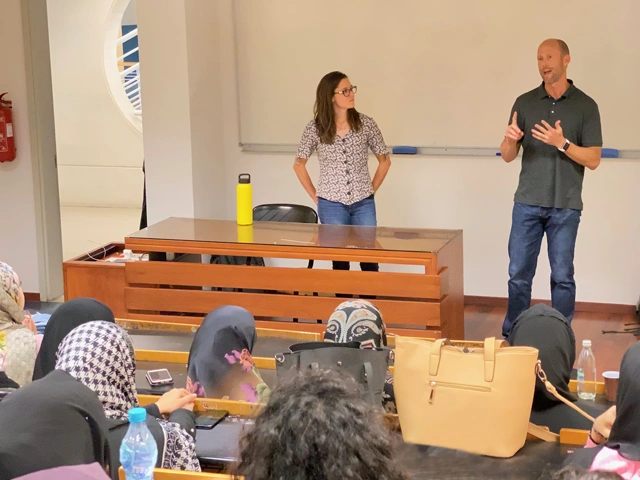
Rachel Hagues and David Cecil, faculty from the Department of Social Work at Samford University, recently received funding to begin a project in collaboration with Haigazian University that aims to impact and support social workers in Lebanon. The new initiative is the culmination of relationships built between Samford’s Department of Social Work and Haigazian since 2019.
“We see clear connections between ongoing education and training as a source of encouragement to our colleagues,” said Cecil. “So, we hope we can reinforce and help them find more effective strategies to prevent burnout.”
The initiative, titled “Lebanese American Social Work Collaboration: Equipping Social Workers in Lebanon for Practice with Vulnerable and Disadvantaged People,” is funded by the U.S. Embassy in Beirut and involves faculty from both universities and other professionals who will help supervise the work.
Hagues and Cecil began researching the experiences of social workers who work with refugees in 2016. Their studies brought them across the world, from Germany to Greece and to Lebanon, where they connected with their colleagues at Haigazian. Their research gained support from the president of Haigazian at the time, but due to the COVID-19 pandemic and economic uncertainty in Lebanon, additional research in the region was halted. Once Hagues and Cecil were made aware of the U.S. Embassy grant, they applied and now have the opportunity to collaborate with their colleagues again.
“Our colleagues at Haigazian are great. They have been through so much themselves, so to see their ability to carry on and continue to do this work to help others is pretty amazing,” Hagues said.
In the project's first phase, social workers in Lebanon will undergo a needs assessment to discover the greatest needs and challenges in their field. From there, modules will be developed to deliver in-person and online training to the workers based on the findings in the questionnaire. Hagues and Cecil hope that travel restrictions will soon be lifted so they can join their Haigazian University colleagues, Shaghig Hudaverdian and Bedros Kazazian, in Beirut to lead in-person courses over the next few years.
GIVE: Donate to the Department of Social Work at the School of Public Health
The initiative was officially launched on December 11 at an event hosted by Haigazian’s Center for Continuing Education. Representatives from the U.S. Embassy attended the event, along with Hudaverdian and Kazazian, local social workers, unions, and other relevant associations. Due to travel restrictions between the U.S. and Lebanon, Hagues and Cecil attended the event virtually.
Hagues and Cecil were both drawn to this project out of concern for their fellow social workers. They said that stress, burnout, and secondary trauma impact social workers in America and worldwide, so they hope to make a difference through their findings.
“We hear the stories of refugees who became social workers and how they have so much hope and joy that they want to pass on to other people who are suffering,” said Hagues. “We just want to be a part of that, even if it’s on a small scale.”
